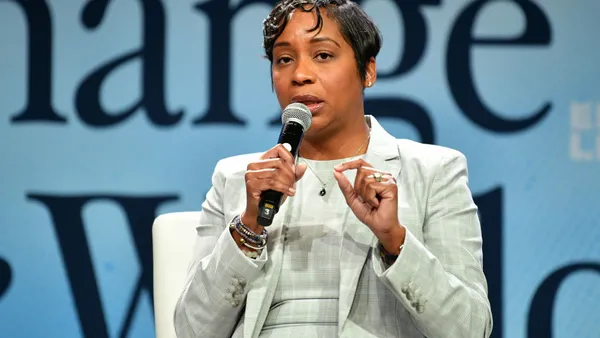UPDATE: September 27, 2019: More than 100 local government officials from 31 states wrote McDonald's a letter Thursday urging the chain to create more stringent anti-sexual harassment policies, according to a Reuters report. The letter stated that McDonald's workers have filed over 50 sexual harassment complaints with the U.S. Equal Opportunity Commission.
Dive Brief:
- McDonald's and its National Franchisee Leadership Alliance introduced a new training initiative on Wednesday aimed at keeping its restaurant employees safe and building professional and respectful workplaces, a press release announced. The training will begin in October and will cover approximately 850,000 restaurant employees.
- Building on training launched last year for franchisees and general managers, the new initiative will focus on mitigating workplace violence; preventing harassment, discrimination and retaliation; building awareness about the impact of unconscious bias; the prevention of bullying; and understanding bystander scenarios.
- The program includes a combination of interactive and computer-based training and in-person discussions. Feedback from the program will be shared throughout the system and outside experts to improve the next phase of curriculum in 2020.
Dive Insight:
McDonald's pointed to its new training program when asked for comment about the letter, according to Reuters.
“These actions are one more step we are taking to raise awareness at all levels of McDonald’s that will transfer both inside and outside the workplace," McDonald's USA President Chris Kempczinski told the publication.
This training is one of many efforts the QSR giant has taken in the past year to mitigate workplace risks. In January, McDonald's enhanced its discrimination, harassment and retaliation prevention policy. McDonald's has also launched a free, anonymous hotline for employees, committed to an annual policy and training review and developed a global diversity initiative to achieve gender equity.
The initiatives come on the heels of a number of complaints and lawsuits lobbed against McDonald's for sexual harassment in the workplace. In 2018, McDonald's employees in 10 cities went on strike to protest sexual harassment, and a total of 50 charges and suits have been brought against the company throughout the past three years. McDonald's is certainly not alone with these issues. A 2016 study by Hart Research found that 40% of women working at QSR chains report being sexually harassed at work.
In addition, the National Employment Law Project (NELP) found 721 instances of violence against McDonald's workers were reported in the media over the past three years, representing a fraction of total instances. Researchers attributed rates of violence faced by McDonald's employees to the chain's long hours, as higher rates of violence occur at late-night retail. The NELP report cited a number of preventative measures that the company could implement to address workplace violence, including equipping all stores with hazard controls such as safe drive-thru windows and visible panic buttons for staff.
The fact that McDonald's continues to face backlash — and now from a contingent of concerned mayors, commissioners, city councilors and school board members — suggests that its anti-bullying training may not be sufficient. To address the scale of its workplace violence, the chain might need to invest in physical safeguards for staff at its nearly 14,000 U.S. stores.
In addition, a Vox report noted that dozens of complaints by McDonald's workers to the Occupational Safety and Health Administration have cited deliberate understaffing by the corporate-run scheduling system, which placed employees both at risk of injuries and hazardous conditions and of bullying from managerial staff.
A comprehensive, systemwide training program covering these topics is nonetheless a step in the right direction. Not only are these types of issues costly for companies to defend, they also contribute to a negative workplace environment, which can ultimately affect customer service. A reduction of harassment incidents can also lower turnover, another critical focus area in an unusually tight labor market.













